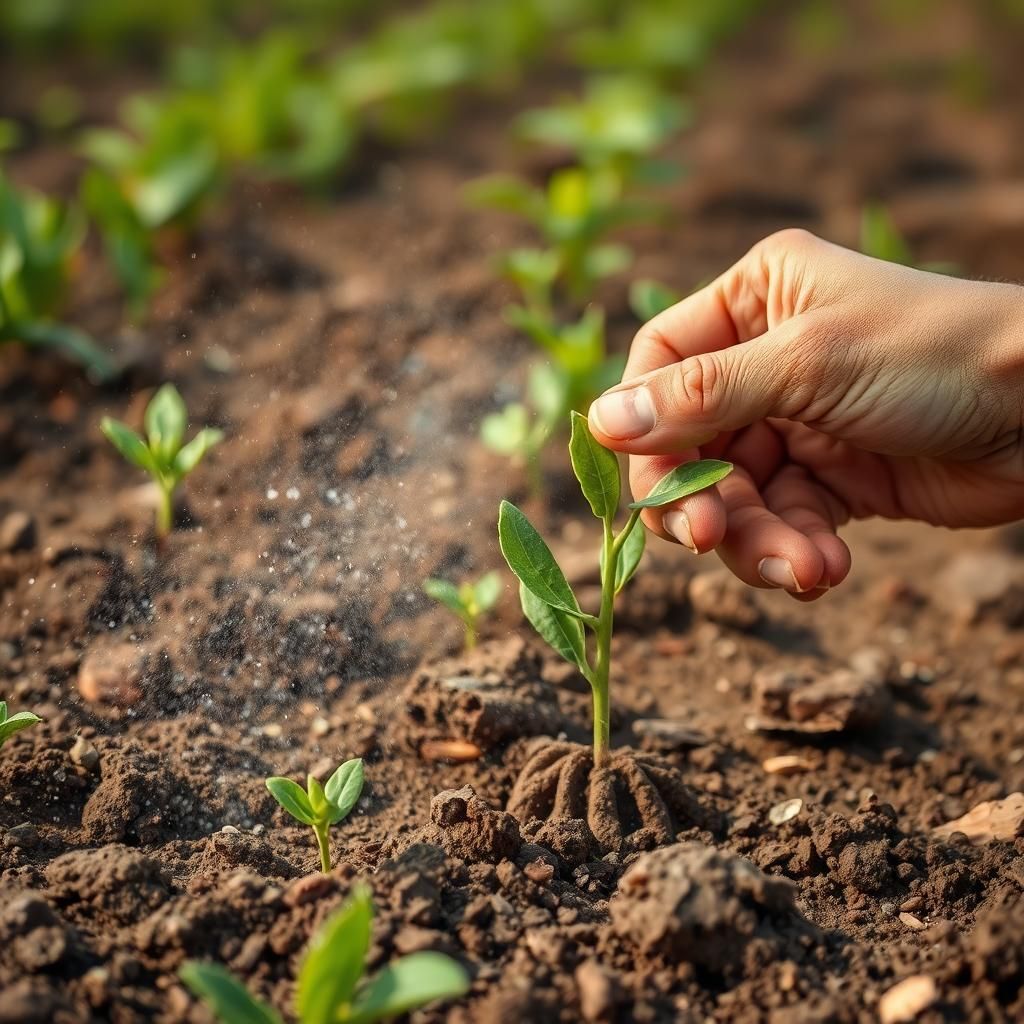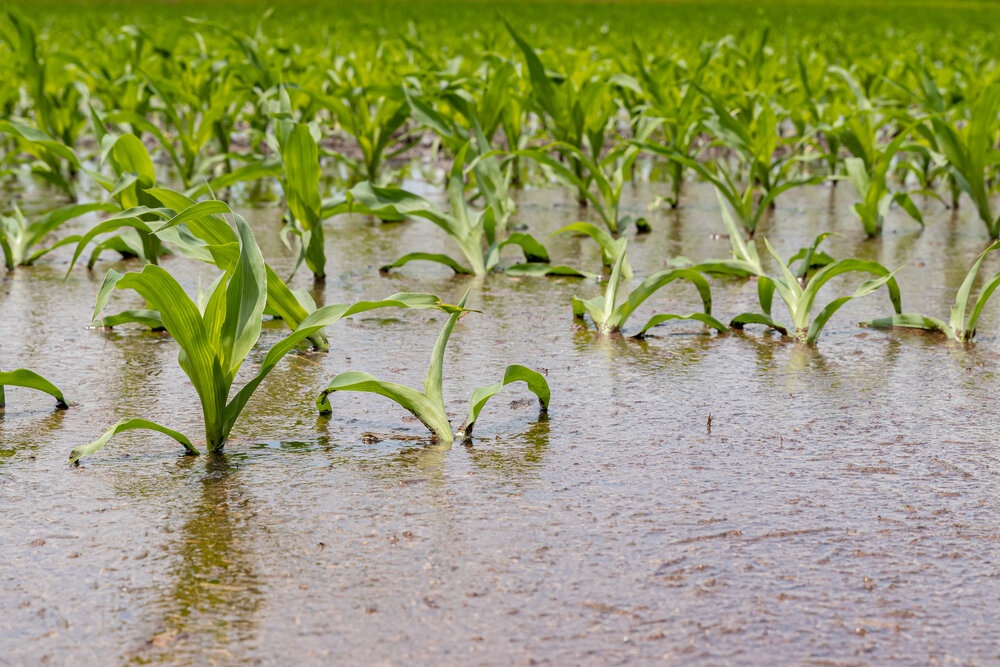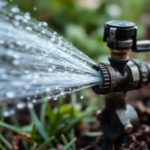Why is Too Much Irrigation Bad? Exploring the Negative Effects on Soil and Crops

Irrigation is a crucial agricultural practice that ensures crop growth and food production, particularly in arid regions. However, excessive irrigation can lead to a range of detrimental effects on both soil health and crop yield. Overwatering can cause soil erosion, nutrient leaching, and the salinization of soil, ultimately compromising its fertility. Moreover, it can create an environment conducive to pests and diseases, negatively impacting plant health. This article delves into the negative consequences of over-irrigation, highlighting the importance of balanced water management strategies to sustain agricultural productivity and maintain healthy ecosystems.
Why is Too Much Irrigation Bad?
Excessive irrigation can have detrimental impacts on both the environment and agricultural productivity. When crops receive too much water, it can lead to waterlogging, which limits the availability of oxygen in the soil. This condition can harm the root systems of plants, making them more susceptible to disease and reducing their overall health and yield. Additionally, over-irrigation can contribute to salinization, where salts accumulate in the soil, further degrading soil quality. Furthermore, excessive water use can strain local water resources, leading to larger ecological consequences such as reduced water levels in rivers and lakes, affecting wildlife and plant life that depend on these ecosystems.
Waterlogging and Its Effects
Waterlogging occurs when soil is saturated with moisture, resulting in standing water that deprives roots of the oxygen needed for healthy growth. This condition often leads to root rot, stunted growth, and ultimately lower crop yields. Furthermore, waterlogged soils can promote the development of pathogens, enhancing disease prevalence in crops. The intricate balance between water management and soil health illustrates the necessity of effective irrigation practices.
Salinization Risks
Salinization happens when excess water causes the dissolution of salt minerals in the soil, which can be detrimental to plant life. As irrigation water evaporates, it leaves behind salts that accumulate in the soil. High salt concentrations can interfere with plant nutrient absorption and reduce overall crop viability. Farmers must be vigilant in managing irrigation practices to avoid this silent threat that can lead to long-term soil degradation.
Impact on Water Resources
Over-irrigation places significant pressure on local water resources, leading to a depletion of aquifers and decreased streamflow in nearby rivers. This situation can cause conflicts between agricultural needs and water availability for domestic and ecological purposes. Moreover, as groundwater levels decline, the cost of water extraction can increase, impacting overall agricultural sustainability and economic viability for farmers.
Increased Pest and Disease Problems
Excess moisture in irrigation can create an ideal environment for pests and diseases, as many insects thrive in humid conditions. The prevalence of pests can lead to more dependency on pesticides, which can pose health and environmental risks. Furthermore, crops that are overwatered may be more susceptible to specific fungal diseases, highlighting how vital proper irrigation practices are to maintaining healthy crops and reducing the risk of agricultural losses.
Soil Erosion
Frequent and excessive irrigation can lead to increased soil erosion, especially on sloped land. When water saturates soil, it can wash away topsoil, stripping it of vital nutrients needed for crop growth. This erosion not only impacts agricultural lands but can also lead to sedimentation in waterways, harming aquatic habitats and reducing water quality. Effective irrigation management is essential to protect soil integrity and ensure sustainable agricultural practices.
| Negative Effects | Causes | Solutions |
|---|---|---|
| Waterlogging | Excessive irrigation | Implementing proper drainage systems |
| Salinization | Inefficient water usage | Utilizing drip irrigation |
| Depleted water resources | Over-extraction of groundwater | Rainwater harvesting |
| Pest and disease proliferation | High humidity levels | Integrated pest management |
| Soil erosion | Runoff from saturated soils | Contour farming |
Why is too much irrigation harmful?

Excessive irrigation can lead to various environmental and agricultural issues, significantly impacting soil health, water resources, and crop productivity. Here are several reasons why too much irrigation is harmful:
Soil Salinization
Excessive irrigation can cause soil salinization, which occurs when the water evaporation leaves salts behind, leading to a buildup of these substances in the soil. This process can have detrimental impacts on agricultural productivity and ecosystem health.
- The increased salt concentration can hinder plant growth by affecting nutrient uptake.
- Salinized soils often require amendments and treatments to restore their fertility.
- High salinity can lead to long-term soil degradation, affecting biodiversity and ecosystem functions.
Groundwater Depletion
When irrigation exceeds the sustainable limits of aquifers, it leads to groundwater depletion, which can result in serious water shortages over time.
- This depletion can cause land subsidence, cracking the surface and damaging infrastructure.
- Once groundwater resources are exhausted, restoration can take decades or longer.
- Overdependence on groundwater can lead to increased costs for water extraction and management.
Waterlogging and Poor Crop Health
Excessive water application can result in waterlogging, where the soil becomes saturated with water, depriving plants of necessary oxygen and leading to poor crop health.
- Waterlogged conditions can promote the growth of pathogenic organisms and diseases in root systems.
- Roots may rot due to lack of aeration, affecting overall plant vigor and productivity.
- Farmers may face reduced yields and poorer quality produce, impacting their economic viability.
Nutrient Leaching
Overirrigation can lead to nutrient leaching, where essential nutrients are washed away from the soil, making them unavailable to plants.
See also:
- Nutrients such as nitrogen and phosphorus can seep into deeper soil layers, negatively affecting crop yields.
- This leaching can contaminate local water supplies, resulting in environmental pollution.
- An increased reliance on fertilizers may result from nutrient losses, contributing to economic and environmental strain.
Disruption of Local Ecologies
Excessive irrigation practices can disrupt local ecologies, impacting natural habitats and species.
- Altered water tables can affect wetlands and other important ecosystems, reducing biodiversity.
- Changes in water flow can disrupt the natural processes of surrounding habitats.
- Irrigation may lead to the introduction of invasive species, further destabilizing local ecosystems.
What happens if you irrigate too much?

Over-irrigation, or excessive watering, can lead to numerous problems in agricultural practices and gardening. Excessive moisture in the soil can create a series of negative effects that not only harm plants but also disrupt the ecosystem. The most common consequences of over-irrigation include waterlogged soil, nutrient leaching, and increased pest and disease problems.
Waterlogged Soil
Waterlogged soil occurs when the soil becomes saturated with water, reducing the amount of air in the soil. This condition can lead to:
- Root Oxygen Deprivation: Roots require oxygen to perform respiration; excessive water prevents them from getting enough air.
- Root Rot: Prolonged periods of water saturation can lead to fungal infections and root decay, which can kill plants.
- Soil Structure Damage: Over-irrigation can compact the soil, altering its structure and making it challenging for roots to expand.
Nutrient Leaching
When too much water is applied to the soil, it can wash away the essential nutrients that plants need. This phenomenon is known as nutrient leaching. The consequences include:
- Decreased Fertility: As nutrients are washed away, the soil becomes less fertile, leading to stunted plant growth.
- Imbalanced Nutrient Ratios: Some nutrients may be lost more quickly than others, leading to nutrient imbalances that can harm plants.
- Increased Dependency on Fertilizers: Over time, the need for added fertilizers increases to compensate for lost nutrients.
Increased Pest and Disease Problems
Excessive moisture is an ideal environment for the spread of pests and diseases. The effects include:
- Fungal Infections: Conditions created by over-irrigation frequently foster fungal growth, which can decimate crops.
- Attraction of Pests: Many pests thrive in damp environments, leading to infestations that can cause further damage.
- Less Resilient Plants: Stressed plants become more susceptible to infections and pests, complicating management practices.
Reduced Plant Growth
Over-irrigation can stifle overall plant growth due to various factors, including:
- Stunted Growth: Lack of oxygen in waterlogged soil can hinder root development, stunting overall plant growth.
- Poor Fruit and Flower Development: Excessive water can lead to poor yields, as plants may not produce fruit or flowers efficiently.
- Pest-Damaged Leaves: Weakened plants are more likely to experience leaf damage, further affecting their growth and productivity.
Environmental Impact
Over-irrigation can also have broader environmental implications, such as:
- Water Table Depletion: Excessive irrigation can lower the water table, affecting local ecosystems and water availability.
- Soil Erosion: Waterlogged soil can lead to erosion and degradation of the topsoil, further affecting agricultural productivity.
- Pollution Runoff: Nutrients washed away from over-irrigated fields can lead to runoff that pollutes nearby water bodies.
How is over-irrigation damaging to so?

Over-irrigation refers to the practice of applying more water to crops than is necessary, leading to various negative consequences for both the land and the agricultural ecosystem. This method can undermine not only the immediate crop yield but also the long-term viability of agricultural practices.
Soil Degradation
Over-irrigation often leads to significant soil degradation, which can negatively impact crop health and yields. The excess water saturates the soil, causing it to lose its essential structure and nutrients.
- Compaction: Excess water can lead to soil compaction, reducing air spaces that are crucial for root growth.
- Nutrient Leaching: Important nutrients such as nitrogen and potassium are washed away, making them unavailable to plants.
- Soil Erosion: The constant flow of excess water can erode the top layer of soil, which is vital for plant growth.
Waterlogging
Waterlogging occurs when soils are saturated beyond their capacity, which can severely impact root systems.
- Oxygen Depletion: Roots require oxygen to thrive; waterlogged soils become anaerobic, leading to plant stress and potential death.
- Disease Propagation: Wet conditions create a favorable environment for soil pathogens, increasing the risk of plant diseases.
- Reduced Crop Diversity: Over-irrigation can limit the ability to grow different types of crops that require drier conditions.
Salinization of Soil
One of the often-overlooked consequences of over-irrigation is the salinization of soil, which weighs heavily on agricultural productivity.
See also:
- Salt Accumulation: Excess water dissolves salts in the soil, which then rise to the surface as water evaporates, creating a salty layer.
- Impact on Plant Growth: High salt concentrations can inhibit plant growth, reducing crop yields drastically.
- Soil Toxicity: Certain salts can be toxic to plants and can further degrade soil quality over time.
Reduced Biodiversity
Over-irrigation can lead to a decline in soil biodiversity, which is essential for maintaining a healthy agricultural ecosystem.
- Loss of Microbial Life: Excess moisture can kill beneficial microbes that contribute to nutrient cycling and soil health.
- Disruption of Soil Fauna: Overly wet conditions negatively affect earthworms and other soil organisms that play crucial roles in soil aeration and fertility.
- Imbalance in Ecosystems: With a decline in biodiversity, ecosystems may become less resilient to pests and diseases.
Economic Implications
The economic impact of over-irrigation can be profound for farmers and agricultural systems as a whole.
- Increased Costs: Farmers may face higher water bills and increased need for fertilizers to compensate for lost nutrients.
- Yield Loss: Reduced crop yields due to poorer soil health can lead to significant financial losses for farmers.
- Long-term Sustainability: Unsustainable farming practices can lead to declining farm viability and higher vulnerability to market fluctuations.
What are the negative impacts of irrigation?

The negative impacts of irrigation can be significant, affecting both the environment and agricultural practices. While irrigation is essential for boosting crop yields in many arid and semi-arid regions, it also carries a range of detrimental effects that need consideration.
Soil Salinization
Soil salinization occurs when irrigation water evaporates, leaving behind dissolved salts that accumulate in the soil. This buildup can reduce soil fertility and hinder plant growth, leading to decreased agricultural productivity. The effects of soil salinization include:
- Reduced crop yields due to toxic levels of salts.
- Soil structure degradation, affecting water infiltration.
- Increased irrigation costs as more water is required to leach salts away.
Waterlogging
Waterlogging is a condition resulting from excessive irrigation, where soil becomes oversaturated with water. This can lead to a lack of oxygen in the root zone, which can be detrimental to crops. The implications of waterlogging include:
- Decreased root respiration, leading to poor plant growth.
- Increased susceptibility to diseases, particularly root rot.
- Potential loss of arable land as waterlogged areas become unproductive.
Impact on Local Ecosystems
Irrigation can significantly alter local ecosystems, drawing water from rivers, lakes, and aquifers. This withdrawal can impact both terrestrial and aquatic life. Key points include:
- Reduction in water levels, affecting fish and aquatic habitats.
- Altered soil moisture levels, impacting surrounding flora and fauna.
- Changes in salinity levels in nearby water bodies, affecting biodiversity.
Dependence on Chemicals
The necessity for irrigation can lead to increased use of chemical fertilizers and pesticides, as farmers attempt to maximize crop yields in artificially maintained environments. This dependence has several downsides:
- Soil degradation due to chemical runoff and accumulation.
- Water pollution from agri-chemicals contaminating local water supplies.
- Development of pest resistance, leading to higher pesticide use over time.
Socioeconomic Consequences
The impacts of irrigation extend beyond agricultural realms, influencing socioeconomic conditions in various ways. These consequences can be profound, including:
- Increased competition for water resources, leading to conflicts among users.
- Economic disparity between regions with access to irrigation and those without.
- Potential overreliance on irrigation, making communities vulnerable to water shortages.
Questions from Our Readers
Why can excessive irrigation lead to soil degradation?
Excessive irrigation can cause soil degradation by washing away essential nutrients and leading to salinization. When too much water is applied, the natural balance of nutrients is disrupted, making it harder for plants to thrive and impacting overall soil health.
What are the environmental impacts of over-irrigation?
Over-irrigation can result in significant environmental impacts, such as waterlogged soils and the depletion of local water resources. This excessive use of water can alter local ecosystems, reduce biodiversity, and contribute to water scarcity in surrounding areas.
How does over-irrigation affect crop yields?
While irrigation is crucial for crop growth, over-irrigation can harm crop yields by promoting the growth of pests and diseases. Additionally, waterlogged conditions can lead to root rot, negatively affecting plant health and ultimately reducing the quantity and quality of the harvest.
Can excessive irrigation affect groundwater levels?
Yes, excessive irrigation can significantly impact groundwater levels by causing them to drop. When irrigation demands exceed natural replenishment, it can lead to the depletion of aquifers, resulting in long-term issues like reduced water availability for both agriculture and human consumption.
See also:

If you want to read more articles like Why is Too Much Irrigation Bad? Exploring the Negative Effects on Soil and Crops, we recommend you check out our Irrigation category.
Leave a Reply
Related Articles